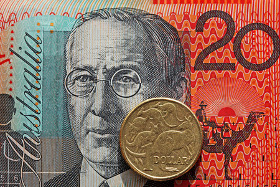The Australian dollar declined today after China released a bunch of macroeconomic indicators, some of which missed expectations. China is Australia’s biggest trading partner, making its economic well-being very important for the Australian economy and currency.
The National Bureau of Statistics of China released macroeconomic data for November today. Industrial production rose 5.4%, year-on-year, slowing from the 5.9% rate of growth registered in October, whereas economists had expected the expansion to proceed with the same pace. Fixed asset investment rose 5.9% in January-November from the same period a year ago, accelerating from the 5.7% rate of growth in the previous reporting period and matching expectations. Retail sales were up 8.1%, year-on-year, missing expectations of an 8.8% increase and slowing from the 8.6% rate of increase logged in October. The unemployment rate ticked down from 4.9% in October to 4.8% in November.
The data hurt riskier currencies, especially those of China’s trading partners. Specifically, the Australian dollar and its New Zealand counterpart were the weakest currencies on the Forex market during the current trading session.
AUD/USD dropped from 0.7226 to 0.7168 as of 10:53 GMT today. EUR/AUD was up from 1.5721 to 1.5759, touching the high of 1.5822 intraday. AUD/JPY sank from 82.09 to 81.37.
If you have any questions, comments or opinions regarding the Australian Dollar,
feel free to post them using the commentary form below.
Australian Dollar Trades Lower After China’s Data Misses Expectations
